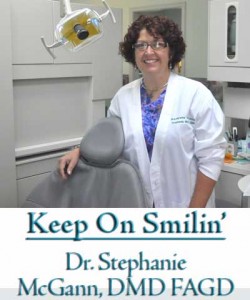A dip in the pool can take a bite out of your smile, so watch your chemistry
By Dr. Stephanie McGann, DMD FAGD, Columnist, KennettTimes.com
 It may seem odd that when a patient sits in my dental chair I might ask about their swimming habits. This summer thousands of folks will be splashing away in their backyard pools. Some of these people may be putting their dental health at risk.
It may seem odd that when a patient sits in my dental chair I might ask about their swimming habits. This summer thousands of folks will be splashing away in their backyard pools. Some of these people may be putting their dental health at risk.
Why? Pool water can become very acidic if the chemistry is not monitored and adjusted regularly. Simply put, a poorly maintained swimming pool can erode away a lot of dental enamel. This loss of enamel can make teeth weak, discolored and prone to sensitivity and decay. The centers for disease control (CDC) has reported numerous cases of individuals with compromised teeth related to extended exposure to acidic swimming pool water. A recent report by the NY College of dentistry highlights the rapid erosion and dental problems associated with poorly maintained pools.
So here it is my first column on dental health and I’m talking about swimming pools.
Maintaining great swimming pool water is an exact science. Sometimes, keeping swimming pool water in balance is like herding cats. One level goes up, one down and then the sun comes out and messes up the chlorine level, you get the idea. However, for the sake of this discussion we are focused on the pH and why it matters. When I see a patient with eroded enamel, particularly on the outside of the font teeth (The parts of the teeth you see in a smile) I always consider the cause. While grinning during a sandstorm could cause the same dental problems, it’s more often caused by acids.
Acid erosion is a real dental problem. I must mention that we put acidic food and beverages in our mouths every day. The duration of contact is the key. The longer an acid is in contact with a tooth, the more enamel erodes away. Some wine is very acidic, but we tend to swallow and rarely are our teeth in contact with it for hours at a time. If you’re a professional wine taster we may need to speak in private. Some people get enamel erosion from a lemon sucking habit. I like lemon, but I prefer not to chew on them for hours at a time. Three cheers pucker-power.
Symptoms of enamel erosion from acid exposure.
• Sensitivity When the outer covering (enamel) wears away the more sensitive dental layer is exposed. This means hot, cold and sweet things might be bothersome to eat.
• Discoloration Eroded teeth are more yellow because the pearly enamel is thin or gone The surface is rougher and will stain very easily. It may appear chalky white or mottled brown.
• Thin or transparent teeth The thinner and more worn a tooth gets, the more transparent they become sometimes the edges may appear almost blue or grey.
• Weakening or cracking of teeth Teeth weakened by acids are more susceptible to cracks. They may feel “soft” when chewing.
• Fillings that seem to levitate Dental work may appear to be rising up out of teeth when in fact the teeth are dissolving away from the restoration.
• Teeth that feel gritty or rough Acid erosion can etch the teeth making them feel rough or gritty. Swimming pool erosion is most often felt on the parts of teeth that show when you smile.
Years ago it was thought this phenomenon only occurred in competitive swimmers who spent hours every day training in large pools chlorinated with chlorine gas. (This method of chlorination almost always leads to highly acidic water) Today we know that any pool with a pH lower than 6 – 6.8 is a risk to our teeth. My kids spend enough time in the water to win Olympic medal for pool antics. Swim in a lake?-Best bet is to keep your mouth closed; some natural bodies of water have very low pH’s related to acid rain.
Am I picking on pool owners? Hardly since I am a self defined water-rat and long time pool owner. Not long ago after a rainstorm my own pool water dipped below the 6 mark on pH scale. Just keep in mind to brush, floss and check your pool chemistry every day! Now where did I put that bucket of soda ash?
Dr. Stephanie McGann is a resident of the Unionville area and along with her partner, Dr. Marie Scott, operates The Brandywine Smile Center, a family-friendly dental practice in Concordville. She is a Fellow of the Academy of General Dentistry.




